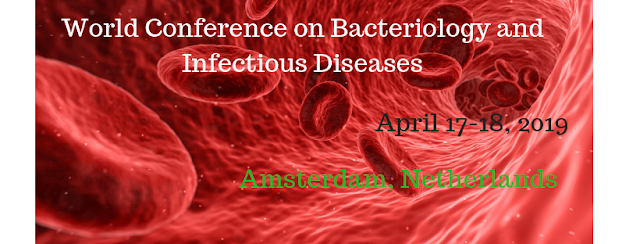Theme: Exploring Innovative & Integrative Researches and Frontiers in Bacteriology and Infectious Diseases
Date: April 17-18, 2019
Conference Venue: Amsterdam, Netherlands
Thursday, 24 January 2019
Wednesday, 23 January 2019
Fungal Infectious Diseases
These infections are commonly called 'ringworm', but are not caused by worms. They are superficial infections of the skin, hair or nails caused by a variety of fungi which otherwise live in the soil, on animals, or sometimes only on people.
Infections are spread by direct skin contact (with humans or animals), or indirectly from contaminated articles on floors or in the soil. Shared changing rooms and showers are often a source of tinea, while some infections are spread by sharing of items such as towels. People shed tiny pieces of skin all the time and if these contain a small amount of the fungus, it is able to survive in the environment and cause infection in someone else.
Tuesday, 22 January 2019
Bacteriology 2019
Immunology covers all aspects of the interrelationship between bacterial agents and their hosts. Immunology studies the functions, mechanisms and significance of human defence systems in various disease conditions. Every day of our lives, we are exposed to microbes such as bacteria, viruses, and parasites.
The single system in the body that allows life to continue in the face of these assaults is the immune system. The immune system is the network of cells and their biological processes that enable the body to recognize diseased cells or the invasion by microorganisms (bacteria, viruses, parasites, and prions) and eliminate them. Collectively, these two disciplines address how humans and other mammals respond to bacterial disease.
Monday, 21 January 2019
Student Registration
#World Conference on Bacteriology and Infectious Diseases# April 17-18, 2019 #Young Research Scientist #Student Category #Get Certified @ Bacteriology 2019 #Amsterdam#Netherlands.
Bacteriology 2019 @ Register
Saturday, 19 January 2019
Bacterial Pathogenesis
Bacterial pathogenesis is the process by which bacteria infect and cause disease in a host. Not all bacteria are pathogens and have the ability for pathogenesis (also known as virulence). Pathogenic bacteria utilise a number of mechanisms to cause disease in human hosts. One of the Pathogenic Diseases is tuberculosis which is caused by Mycobacterium tuberculosis. It includes other pathogens of bacteria such as Streptococcus and Pseudomonas. These pathogens and form of bacteria causes many foodborne illnesses and infections such as tetanus, typhoid fever and diphtheria.
Microbes express their pathogenicity by means of their virulence. The determinants of virulence of a pathogen are any of its genetic or biochemical or structural features that enable it to produce disease in a host. In bacterial host mediated pathogenesis, (e.g., tuberculosis), tissue damage results from the toxic mediators released by lymphoid cells rather than from bacterial toxins.
Saturday, 12 January 2019
Bacteriology 2019
#World Conference on Bacteriology and Infectious Diseases# April 17-18, 2019 # Conform your session in Bacteriology 2019 of Scientific Program #Special Discounts are Available on Group Registrations #Amsterdam, Netherlands.
Register @ Bacteriology 2019
Friday, 4 January 2019
Bacteriology 2019
#World Conference on #Bacteriology and #Infectious Diseases #April 17-18, 2019 at #Amsterdam #Netherlands
#hurry up! Few #slots are #available we are in the #process of Scheduling #Scientific Program#
Subscribe to:
Comments (Atom)






